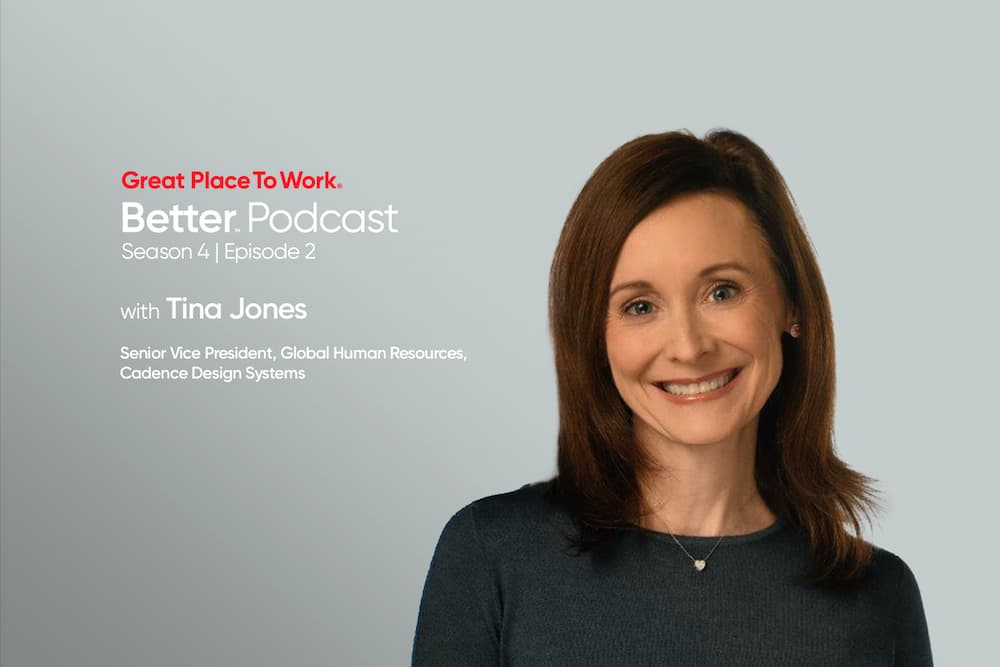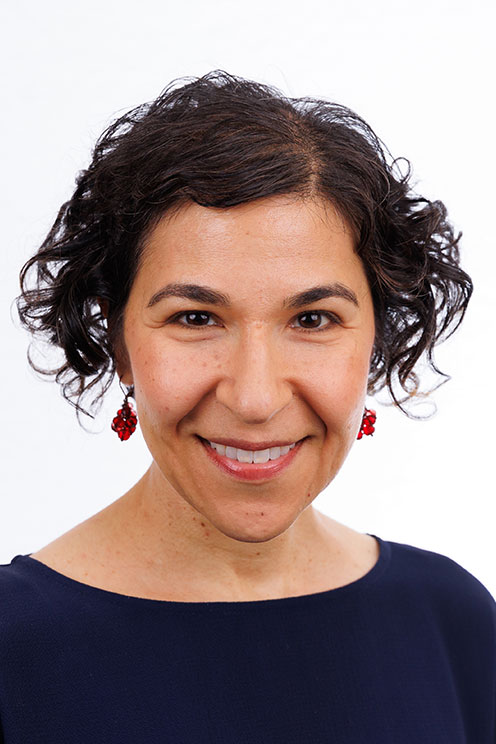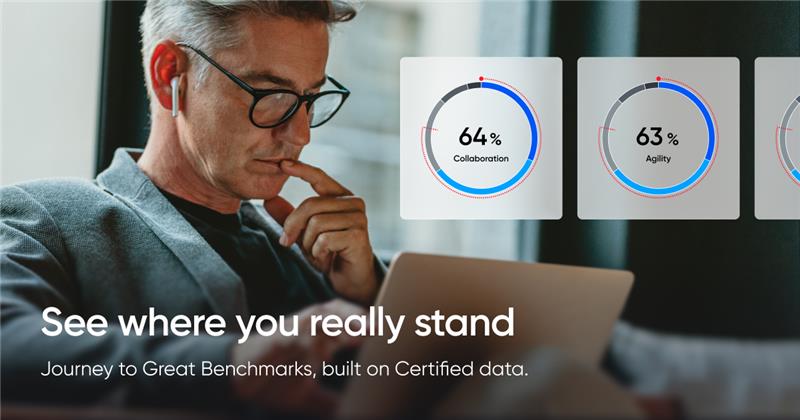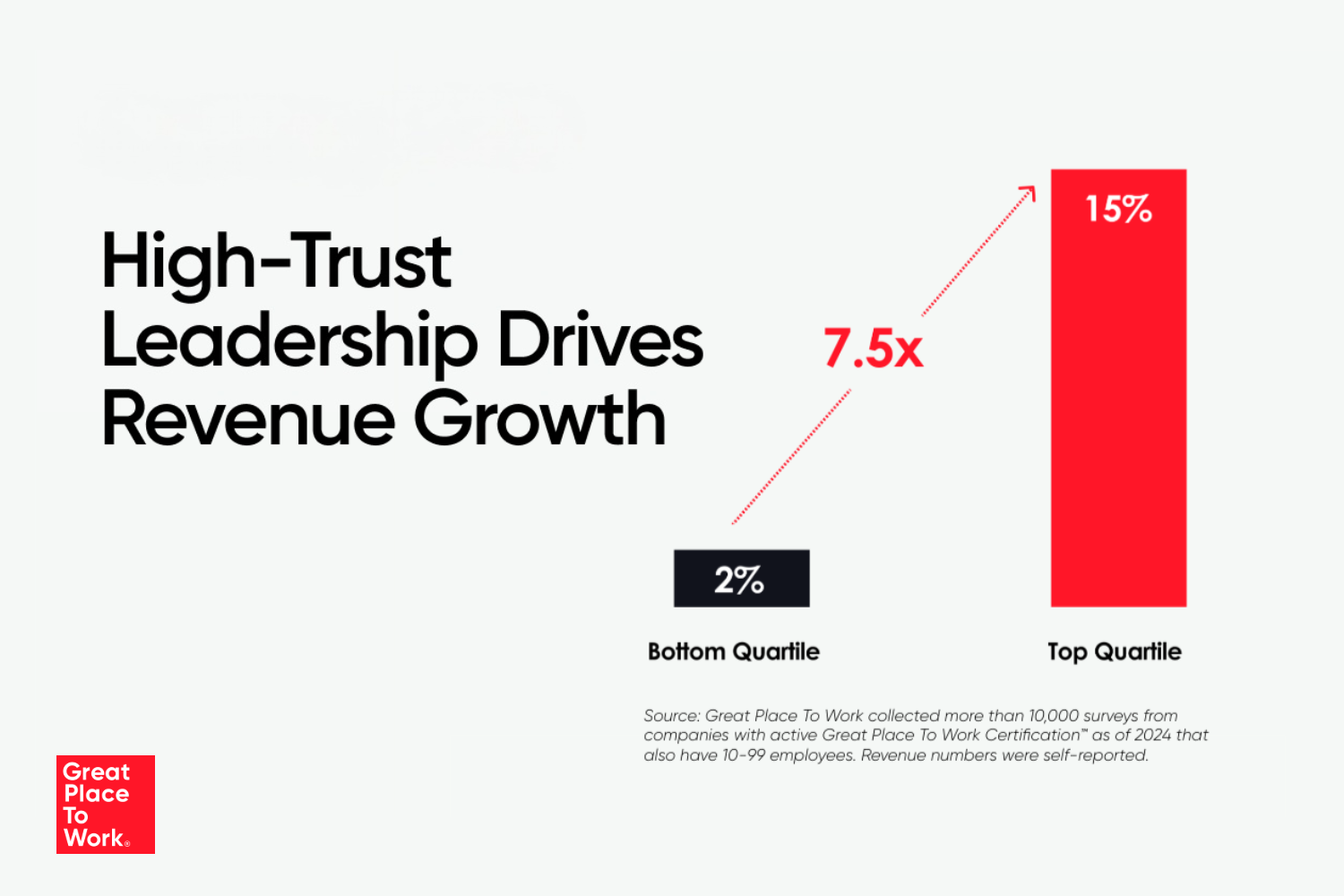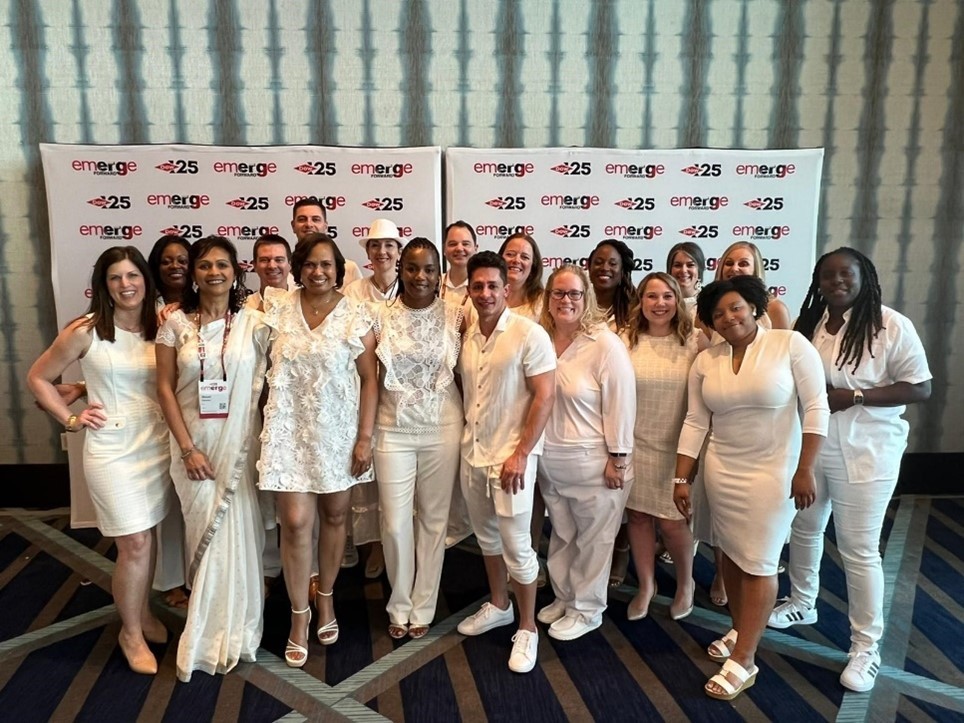DEIB, ERGs, Leadership & Management, Women in the Workplace
“Being comfortable with numbers, analytics, and data is becoming more and more important to being an HR leader. You have to speak from a place of data to be credible and to have influence.”
On this episode of the Better podcast, Tina Jones, senior VP of global human resources at Cadence, talks about a unique approach to making the company's top 100 leaders accountable for creating more equitable teams.
Hint: it involves their paychecks.
She also shared how to avoid mistakes around inclusion groups by tying their input to business strategy so they’re more than networking and social groups.
We also dove into the most important skills HR pros — newbies or veterans — should have.
On the impact of tying leaders’ bonuses to progress around creating more equitable teams:
Something that we put into place a number of years ago has been linking the top 100 leaders' bonuses to progress we make with respect to ESG. A piece of that is hiring and pure representational diversity. Hiring more women and retaining our women after we get them is an example.
When you're measuring things and you're reporting on them, leaders who are very goal-driven tend to pay more attention. By putting it in a bonus, suddenly you've got leaders calling you and saying, "Oh wait, how can I make change here? How can I be a mentor? How can I attract more university students to the company and bring more diversity?"
It’s bigger than just a hiring goal and has some very subjective components. We definitely look at the attitude of the leader, how much that person is going out of his or her way to be a mentor, to drive change in their organization, to represent Cadence externally in areas we think are important beyond just the technology. Is their team really changing in complexion, and culture, and attitude?
On common mistakes to avoid when it comes to inclusion groups:
The mistakes we've probably all made over the years is that these groups can be sidelined and become networking social groups, and not be listened to as a way to create business success.
For example, we want to empower the women at Cadence to have a serious voice on policies, development, mentorship, and things that are business critical so we can hopefully move those areas in a way we wouldn't be able to do without their voice.
We’ve brought women together from all over the world and broken them into groups around their interest areas. That can be around: Are our policies equitable? Do women have a voice when we're sitting around a table working on a problem together? And if they don't, what do we need to do to help managers bring people together in a more inclusive way, and pull out people's voices, and make sure we're innovating and getting different perspectives and not just hearing from the same people?
On where companies can begin to transform their ERGs:
There's a lot that can be done incrementally with a little shift in mindset on how we listen and how we incorporate feedback. We can bring their voices in without asking for millions of dollars of investment, without totally transforming what you call your ERGs, without having the CEO bless it before you go and do it.
To the extent companies already have ERGs, maybe you tilt the conversation a bit more toward what can they do to make sure you bring their voice back before you make decisions — whether it's mentorship, development, or how you recruit.
On top HR skills:
I do think there are some core skills. Are you a good communicator — written and verbal? Are you a good project leader?
People in HR need good judgment, need to be a strong communicator, and need to be agile and able to adjust.
Also, being comfortable with numbers, analytics, and data is becoming more important to being a HR leader. You have to speak from a place of data to be credible and to have influence.
Subscribe to Better wherever podcasts are available so you don't miss an episode.
Get more insights
Learn more strategies from our workplace culture experts at our For All™ Summit, April 8-10, 2025 in Las Vegas, NV.
Roula Amire:
Welcome to Better by Great Place To Work, the global authority on workplace culture. I'm your host, Roula Amire, content director at Great Place To Work. On today's podcast, we talk about one way to make leaders accountable for culture change, and that's through their paychecks. Tina Jones, senior VP of global human resources at Cadence shared the impact of that approach with us. We also talked about mistakes to avoid around inclusion groups so they're not just a social group or coffee club, but they're tied to business strategy, and how that's changing how they support women. And I'll leave you with the question I asked Tina, what are the top three skills in HR? Listen in and see if you agree with her answer.
Well, Tina, welcome to the podcast.
Tina Jones:
I'm thrilled to be here.
Roula Amire:
You're my first lawyer turned HR pro that I've interviewed. So as a former litigator, I'm sure you know how to present your case. So I'm looking forward to our conversation. So Cadence is a tech company based in Silicon Valley. And we all know that tech is a male dominated field, but I know you do so much at Cadence to hire and support women. From recruiting, to mentoring, and development, and everything in between. One thing that caught my eye was how you've made your top 100 leaders accountable to attract and retain women so their teams are more equitable. And one way you've done that is through I believe, their pocketbook. So can you share a bit about that and how that's helped?
Tina Jones:
Well, thank you so much for having me on your podcast. I'm thrilled to be representing Cadence. We're just super proud of the company, and how much we've achieved, and the trajectory we're on. We really are the engine behind chip design throughout the world, and we're basically in all, anything electronic that you might own or see, Cadence is embedded in those electronics.
But no question, like other high-tech companies, we've struggled to have a lot of gender diversity. And so we just tried many things over the years, and I'm certainly happy to talk about some of those experiments.
But something that we put into place a number of years ago has been linking the top 100 leaders' bonuses to progress we make with respect to ESG components. And so a piece of that is hiring and just pure representational diversity. Hiring more women, hiring more Black people, hiring more Latinx people in the US, and retaining our women after we get them as an example. But as well as being able to attract top talent and keep top talent at the company and making progress on our sustainability goals.
So it is bigger than just a hiring goal and it has some very subjective components. We definitely look at the attitude of the leader, how much that person is going out of his or her way to be a mentor, to drive change in their organization, to represent Cadence externally in areas we think are really important beyond just the technology. So we really want to look at the whole person and what they're driving, but it also is very results focused as well.
So is your team really changing in complexion, and culture, and attitude? And so we feel it's driving real change, and our leaders here I don't think are driven by absolute dollars and cents, and they're going to do it just for that. But I do think it caught their attention that this is something important to the CEO. And our new CEO Anirudh Devgan put it in place within I think the first 30 days of taking that job. And I think that alone signaled he meant business. This is important to him. This isn't just a nice to have.
Roula Amire:
So based on your experience, you were there before that was in place and obviously after. It sounds like it has helped, even if it's a mindset shift. But that's key. I mean, that's where change begin is changing how you're thinking, changing your attitude, and your beliefs, and behaviors, and the like. Would you recommend this to other companies if they're trying to make their workplace more equitable, to have the senior leaders accountable in that way?
Tina Jones:
Yeah, that's such a good question. When we looked to do it and we did our benchmarking, I was surprised that more companies had not made this change. And I know that many companies are now saying that they're taking ESG type of metrics into account in their incentive programs for especially the top exec team or the most senior exec team. When I looked at this two years ago, we were definitely out there with very few companies to do this at a broader level, like 100 leaders with bigger organizations. So we were definitely unique in going this broad, and in making it a very definite component of the bonus. For most of us, it's about 20% of our bonus. So we still are a bit unique and on the forefront with respect to this.
One key piece of making change at all is alignment. And anytime you can align leaders and therefore their organization behind something that the company thinks is important, I think you've made an important step. And so I definitely think it's served to create alignment to catch people's attention.
And when you are measuring things and you're reporting on them, leaders who are very goal-driven tend to pay attention more. So in HR, we're often pushing things out. By putting it in a bonus, suddenly you've got leaders calling you and saying, "Oh wait, how can I make change here? How can I be a mentor? How can I attract more university students to the company and bring more diversity?"
So suddenly we got much more inbound interest in how they could make a difference on this front. So I believe that it has served a serious purpose for us, and that it can be a very powerful tool for companies to consider.
Roula Amire:
Oh, that's interesting. So inbound. So from those top 100 leaders, you heard more from them after this went into effect?
Tina Jones:
For sure, for sure. Because the thing, when we work in this space, we care a lot about it. We think a lot about it. We're very up to speed on what other companies are doing, what's important in terms of programs, and how we can keep moving the needle and things like that. But most leaders at companies have a lot of priorities, and they've got a lot of pressure on them from a business perspective.
So it's not that they don't want to do something that makes a difference with respect to culture, but sometimes it doesn't fall into the top five priorities. With something like this, again, we signaled that it was important to the CEO, so you get their attention that way. And then suddenly when they have to report to the CEO on how well they've done against metrics, you get their attention again. And then once you've got their attention, you can get their interest.
And they opened up, and we brought them all together for a summit, which actually Michael Bush attended, the CEO Great Place To Work. And we had four hours of just discussing these kinds of topics. And I just felt like we got more interest inbound from putting it into the bonus than we would otherwise have gotten. And once you get to their interests, they all want to make a difference and they want to bring their own creativity and innovation mindset to this topic.
And so that's been a very powerful momentum creator that we got the leaders coming to us, and them coming with their ideas, and it being a real give and take on how we can make a difference.
Roula Amire:
Sounds like a real collaborative effort. So we know one extremely effective and inexpensive way to support employees, no matter who they are, is to hear directly from them. And of course, there are lots of ways to listen to your employees. One way is through employee resource groups, ERGs for short. So for the listener, ERGs are employee led groups based on a shared experience, be that gender, or race for example. And they're a safe space for those members and allies who support them, and supporting their personal or career development goals. I think at Cadence, you refer to these groups as inclusion groups.
Tina Jones:
Right.
Roula Amire:
So my question is, some leaders say their employees have a voice, and they are heard, and inclusion groups aren't necessary. They're nice to have, they're not must haves. So can you share a few specific examples of how inclusion groups help you hear from women or support women in ways you couldn't otherwise? How are inclusion groups unique?
Tina Jones:
Yeah, such a good question. I think there's just power in bringing people together who may be having similar experiences. So we found that just putting people in the same room who are having a similar experience maybe by virtue of their gender, or their race, or their sexual orientation, or being a veteran for that matter, having some similar experience in life that for the individual, there can be something very reassuring and confirming about having a similar life experience in some way and tying that then to the experience they're having at Cadence. So I think there is power just in bringing people together.
I think the mistakes we've probably all made over the years is that these groups get together. There's power in that. You may improve people, their own engagement levels just by getting together, but that they can be sidelined, and be networking social groups, and not be listened to as a source of a way to create business success.
So we've been working with other marquee companies, frankly, through Great Place To Work. They've brought us together, and about 10, 11 of us have made a real commitment called The Great Transformation. And we said we are all working really hard on these topics of improving diversity, making sure we have a culture we're proud of, having an inclusive environment where people can all make a difference. We're all working at that, but the needle is not moving as much as we had hoped. And so let's take a step back and take some unique perspectives on these topics. And let's do some big experiments and try to do things very differently.
And for Cadence, we said we want to really empower the women at Cadence to have a serious voice on policies, on development, on mentorship, on things that we think are really business critical, so that we can hopefully move that in a way we wouldn't be able to do without their voice.
So we are in the middle of that experiment right now, and what we've been able to do is bring women together from all over the world. So we had five different Cadence women's conferences, one in North America, one in Jerusalem, one in India. We just had a global conference. Sorry, we've had four so far. We're planning our fifth, but we just had one in San Diego where we brought 250 women from 15 countries together, and we want to hear from them.
So they've then broken into groups around their own interest areas, and that can be around, are our policies equitable? That can be around, do women have a voice when we're sitting around a table working on a problem together? And if they don't, what do we need to do to help managers bring people together in a more inclusive way, and pull out people's voices, and make sure we're innovating and getting different perspectives? Not just hearing from the same people all the time.
Roula Amire:
Can you share, I guess a specific or two, a business imperative? Maybe just hypothetical. So what ideas would they bring to the bottom line of the business?
Tina Jones:
They've weighed in on our leave policies. So instead of just HR deciding what our leave policies should be, we wanted to hear what's important to our women's groups, as an example, on our leave policy. How should we invest in manager development next year, instead of us just creating it and then pushing it out? We're starting with the, what is most important to the women of our company on how we develop our managers? Okay, we're going to take that perspective before we go and build our programs as examples. They've come back and said mentorship is really important, and so we're going to continue to invest in our mentorship platforms.
And we've just really tilted our development of leaders, of early career people, of managers. We've tilted all of our development programs in a way to make sure we are bringing our women along. Whether they're the ones who are being developed, or they're the ones who are training and development courses end up impacting. We're making sure we're bringing their perspective into who we include in these programs, what the content is, and things like that. So they're really having an influence on how we think about learning and development at the company, frankly.
And then they have tons of great ideas on how we can run meetings differently, and how we can create the leaders of tomorrow, how we can go to universities and recruit. And so we're just bringing their perspectives into so many things we do that end up being really business decisions, frankly. They aren't about getting together and having a social event. This is about, what talent are you attracting to the company, how do you develop them, and who are you choosing to be your leaders? So I'm really proud of the work that these women are doing, and how much they're really impacting our thinking on a lot of these important fronts.
Roula Amire:
Right. It sounds like they're helping develop, you're co-creating policies.
Tina Jones:
Right. Policies and programs, I would say.
Roula Amire:
And programs.
Tina Jones:
Yeah.
Roula Amire:
And is this another example of it needing to be at the leadership? This is happening because your CEO is behind it. It has to be supported at the senior level, because someone else could be listening and say, "Well, this sounds great, but I am going to take this idea to my CEO." And if they're not going to listen to the input of employees to inform those policies and programs, it's not going to go anywhere. It's not going to move, right? So you have to have a leadership who supports approaching inclusion groups in this way, which is great. You have that at Cadence. For those leaders who don't, do you have any suggestions on, I guess, how to make the business case or how to approach the conversation?
Tina Jones:
Yeah. I think also... I mean, trust me, anyone who's in HR if they're listening, has struggled with, "Do I have enough leadership support for things that we believe are important?" So we are always, I think... Again, if you're in HR, you are always figuring out how to make the business case for things that you may think are important to employees, the environment, the culture. So therein lies a ton of our work right there.
But I also think people shouldn't get discouraged by, "My CEO hasn't said he cares about ERGs. My CEO says there's no money to invest next year." We all have those stories. We all think we are the only ones with the stories. But in fact, when you get HR people together, you realize you all have the same stories.
I think there's a lot that can be done on incremental change. To the extent companies already have ERGs, maybe you just tilt the conversation a bit more toward what can they do to make sure you bring their voice back, before you make decisions about how you will carry out some of these things that we're doing anyway.
There are ways we can bring that voice into what we are doing and what most companies may be doing. Whether it's mentorship, whether it's development, whether it's how you recruit, all of that.
So I think we can bring their voices in without asking for millions of dollars of investment, without totally transforming what you call your ERGs, without having the CEO bless it before you go and do it. I think there's a lot that can be done incrementally with a little shift in maybe mindset on how we listen and how we incorporate feedback.
Roula Amire:
Those are great suggestions. We just completed a market research study, so we surveyed employees at a typical workplace. On a great workplace, on a best workplace, at an average workplace. And found that ERG members where anywhere between 25 and 30% more likely if they were a member of an ERG to feel their work was meaningful, to look forward to coming to work, to believe promotions were fair. And this is just at an average company. So the power of to your first earlier point of just being in a group with a shared experience and bringing people together, that alone makes you feel seen, heard, and valued, and you're more invested in that workplace.
Tina Jones:
Right. And we know, because we work on employee survey feedback and things like that. But just feeling that like you just said, you're seen, and heard, and have influence, and that your work matters is much more than half the battle.
And I did look to see, and our scores from women definitely moved in most categories. As we've gone about empowering them, bringing them together, making them feel seen and heard, it did impact engagement scores in many important categories.
So that is confirming for me that just that alone, even if you don't make huge strides with things that are important to them... Which it's often very daunting. You always think, "Oh my gosh, they want to change the world. And I love every idea, but we're never going to get top-down support for all that investment." So that can be very daunting.
My guidance to HR people who feel that way is, don't then be scared to ask. Don't say, "Hey listen, if you want to rewrite every policy, go ahead." Right? Maybe you don't ask it that way, but for them to help you prioritize.
And then, you can also go to leaders and CEOs of companies and say, "We have heard from our women, we have heard from our Latinx group. This is super important to them." And you have some data to support what you think otherwise you might've come to on your own, is an important change. So you're getting data and support for things you think may be important to do anyway.
Roula Amire:
Exactly. And you're speaking the language of the leader by presenting actual data. Then I heard I think we know or Gallup says this is about your specific employee group.
Tina Jones:
That's true.
Roula Amire:
And what they've shared.
Tina Jones:
Right.
Roula Amire:
Hey, better listeners. Want to put your headphones down and meet culture leaders in person, network and learn from the most innovative companies across every industry? Hear from bestselling authors like Angela Duckworth and the Emmy nominated actress Mindy Kaling? Then mark your calendars May 7th through 9th, and join us in New Orleans at the Great Place To Work For All Summit, the can't miss company culture and leadership event of the year. Use the code better 2024 to save $200 off registration before April 7th. Find the code and link in our episode bio. See you there.
So you started your career. You've been a lawyer, and now you're in HR. So I'm very curious how you're going to answer the question I ask all guests, which is, what advice would you go back and give your younger self? You've had some twists and turns as we all have, but is there anything that comes to mind?
Tina Jones:
Oh gosh. I guess to be comfortable taking more risks. I did go to law school and worked as a lawyer, so those are very linear tracks to be on. And I got super lucky that I got offered the head of HR job at Cadence, and was supremely unqualified to take it, but I took it. So I got to learn a lot of it on the job.
But I recognize that is not a normal story. And looking back, I was probably pretty risk-averse and definitely on a put one foot in front of another path. And I think there is plenty of room to take risk and to tie different things in one's career. And there's just much more fluidity than I saw as a younger person.
I interviewed someone this morning who had just such an incredible resume of diversity, and just doing all these different things. And I really thought, "Wow, how cool is that? You've worked in universities, you've been a teacher, you've program managed. You've got all this interesting life experience, career experience that would make you amazing in HR, even though you haven't just been on an HR path per se." And so I was thinking a lot about it just because of meeting this person. I would encourage more risk-taking, thinking of career as being something that can have very different chapters, and maybe less linear. How about that?
Roula Amire:
Yep, that's good. That's good. And I think that's also just a tip for anyone who's hiring people is to look at life experience, diversity of thought. Not be linear in hiring, being open to someone with a different background, who has the skillsets and mindsets that you're looking for in the role, versus this person, maybe if you're hiring for HR and they haven't worked in HR, but boy, they bring a whole wealth of life experience. That's gold.
Tina Jones:
I totally agree. I mean, I look for traits. Number one, are you always learning? Are you flexible? Are you hardworking? Are you collaborative? So I look for traits, and I do think there are some core skills. Are you a good communicator, written and verbal, things like that? Are you a good project leader, project manager? Those things can apply to so many different areas, careers, disciplines, that if you can nail down some of these basics earlier in your career, I just think you can have so much versatility.
And something I love about the HR field, again, I didn't intend to go into it. But there is so much diversity in the field, and you can really lean very operational. You can be a systems person. You want to be more numbers oriented, you can go into compensation. You can be basically a marketeer and be marketing the company's brand. And you can be a communicator and be in communications. You can be an HR business partner and be a coach.
So HR provides just so many interesting facets, I think. And you can rotate, and you can round yourself out by spending a couple of years in different aspects of HR. So that's my plug for HR, is such a cool career that often young people I find have not necessarily considered, but can be such a great opportunity for people to really... It can be challenging, and diverse, and change every day, because you're dealing with people. And HR the field I think has just evolved so much. And what used to be personnel years ago and then became operational excellence has really evolved into this way to connect with people and bring the people aspect to corporate America.
Or beyond America, global corporations. And it's really what you make of it, I think. And you can bring your own perspective, your own touch to these HR jobs, I think make them really interesting.
Roula Amire:
What about some advice for current HR pros? Maybe more veteran leaders who have... Maybe their thinking has already been formed, but the workplace is changing by the day. So is there a skill, maybe a new skill or an underrated skill that you think HR leaders are going to need to have looking toward the future of work?
I thought of that because when you're new to the field, you're a blank slate, you're more open. But when you've been in HR field, and it's changed in so many ways, and it's so different, some people just stay in the same mindset that this is what's right, this is what we do. So maybe that's agility. I don't know what you'd say, but what do you think is helpful?
Tina Jones:
Yeah, that's a great point. My core belief is that most HR people, they need good judgment. I put judgment in the top three for almost any job in HR. They need good judgment. They need to be, I think, a strong communicator, verbal and written. And they need to be pretty agile and able to adjust. Whether you're working on, suddenly we've got budget constraints, we're restructuring. Or we're going to go grow, we need to go find 100 people to start in the next couple months, right? You need a lot of agility to move with the business needs. So I'd say those are probably my three core.
But I do think being comfortable with numbers, which definitely was not a strength of mine. But being comfortable with numbers, and analytics, and data is becoming more and more important to being an HR leader. I think you have to speak from a place of data to be credible and to have influence.
And so I would add that to the toolkit if one can. And each company is so different, but being open to learning, to hearing from other companies, to taking a class, to being comfortable speaking in public. I think that to me, it's not about HR, but being a leader anywhere. It's a hard thing to do. No one enjoys it for the most part. But pushing through that and being comfortable speaking to groups really enables one to amplify the message. And I think it's critical to most leadership jobs.
Roula Amire:
Right. As you were saying you're top three, I thought, well you could apply that to other careers, other skill sets. Well Tina, thanks for joining us today. I really enjoyed the conversation.
Tina Jones:
I love it. Thank you.
Roula Amire:
Thanks for listening. If you enjoyed today's podcast, please leave a five star rating, write a review, and subscribe so you don't miss an episode. You can stream this and previous episodes wherever podcasts are available.


